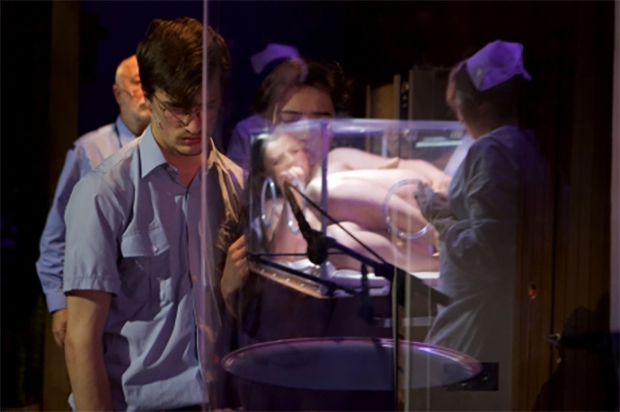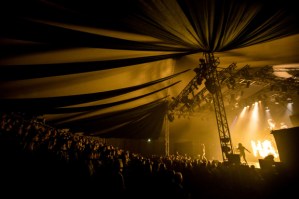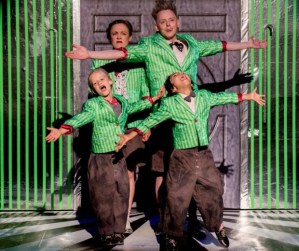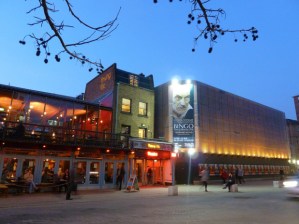
© Herman Sorgeloos
Last week, for the first time in ages, I left the theatre completely confounded. In Helsinki for its annual international festival, I caught the new piece by Belgian dance-theatre company Peeping Tom, and it left me brilliantly, horribly and entirely perplexed.
Moeder – it means 'Mother', the second part of a family trilogy – begins with a last breath. An elderly woman, lying in a coffin in a sound studio, gargles her final death rattles as her family listens in, before being closed up and carted off. From there, it frames the grieving household as an art gallery of sorts. The men of the household are its security guards; the women, its cleaners, curators and artefacts. Friendly well-wishers and fellow mourners become visitors stopping by. Or something. Perhaps.
Peeping Tom’s piece doesn’t follow any kind of logic. It’s a swirl of surrealist images and set pieces. The gallery setting slips and slides – here a maternity ward, there a funeral parlour. Dad gradually replaces all the paintings with self-portraits. His daughter sloshes about on the floor, drowning in carpet. There are paintings that eat people and drawings that bleed. A woman takes a coffee machine for a lover and climbs inside. Bodies glitch and flail. They fall to the floor and fit. Birth pangs play out to a bass beat. Grown women squeeze into incubators. Nuns sing. Cleaners freeze. Children stand and stare.
Theatre doesn’t need to make sense. Quite the opposite. The best of it transcends that altogether
There’s no making sense of all this; no fitting it all together as a rational whole. You get a sense of its subject – the different roles mothers play, religion’s emphasis on motherhood, the centrality of birth and patriarchal control – but Mother doesn’t entirely add up. You can’t pin it down. It’s funny, but I hardly laughed. It’s too horrible for that; too spinny and strange. Gabriella Carrizo’s direction induces a dream state. She goes to work on your subconscious.
It was, for me, a reminder that theatre – art – doesn’t need to make sense. Quite the opposite. The best of it transcends that altogether. It moves beyond meaning into feeling, discomfort, uncertainty and the like. If you can express something straightforwardly – in a speech, say, or a sentence – there seems little reason to do so through art. Art aims at the inexpressible. It pushes past sense to sensibility.
Yet, seeing Moeder, I struggled to remember the last time I felt so brilliantly all at sea in a theatre. British theatre has always had a literary tradition, but it has, I suspect, become more rational and concrete of late. Not that long ago, Shunt were driving hearses stuffed with showgirls and dancing with pig heads beneath London Bridge station. Uninvited Guests were hosting bizarre séances and revelling in Schlock, while oddball young companies like The Cosmic Family and Clout Theatre were emerging in Edinburgh with strange, unsettling shows. New writing had its moments too. Neither Simon Stephens’ Three Kingdoms nor Alistair McDowall’s Pomona make literal, linear sense and both swerve off into surrealism – Estonian cucumber parties and resentful shit-happy seagulls.
Beckett wanted to work on an audience’s nerves, Pinter was often wilfully ambiguous
Go further back and the shows that stick are often the slippery ones. Neither Beckett nor Pinter’s plays make complete sense. Beckett wanted to work on an audience’s nerves, not their brain, and Pinter’s was often wilfully ambiguous. Who knows why Ruth beds in at the end of The Homecoming, or whether Spooner and Hirst really know one another. That ambiguity is potent. Its open-endedness is troubling, and it jangles an audience as they leave. You find something similar in Sarah Kane’s plays. Cleansed, for example, is all the more powerful because it can’t be pinned down. Its images burrow into your brain. They stay with you for days.
There’s a tendency, as a critic, to praise shows that make sense over those that don’t. With a deadline fast approaching – always – it’s easier to make a case for theatre that lays out its meaning. Such shows are easily described and easily explained – bish, bash, bosh, four stars. We’re not alone in that, either. Audiences are just as likely to come away pleased with a neatly packaged, take-home message: ‘It was a play about X – and it was good.’
Theatre has grown more overtly political of late, it has become less oblique
But art that gives us all the answers, shows that lay us trails of breadcrumbs to follow, are often only superficially satisfying. It’s those that unsettle and confound, that give us the runaround and get under our skin, that often leave the longest impression.
So where exactly is that work in Britain today? Why aren’t we seeing it very often? Two reasons, I suspect. First, as theatre has grown more overtly political of late, it has become less oblique. There is, after all, little point in registering dissent if your message doesn’t read loud and clear. Second, theatre has sought to open itself up to new audiences and increase accessibility – a vital mission that, nonetheless, tends to avoid the risk of alienating audiences with anything too unnerving or confusing.
That’s all well and good, but we mustn’t lose sight of the stranger stuff. After all, the world rarely makes sense. Why should theatre?
















